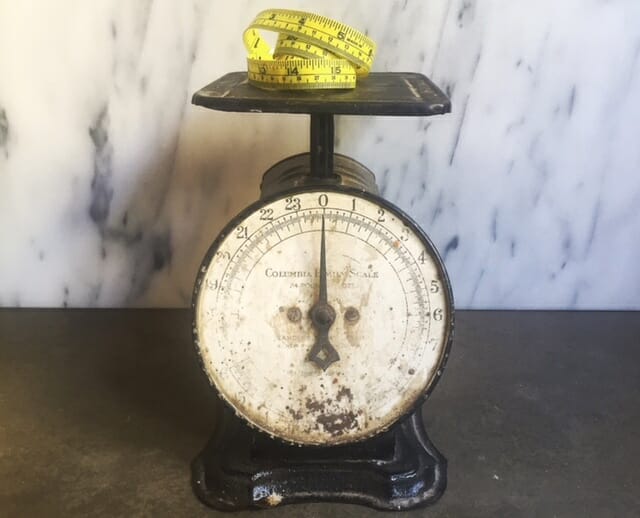Few people I know are as disciplined about their health and weight as my stepmom, Maureen. She’s maintained a slender frame for her entire adult life through daily exercise and a nutritious diet that allows some wiggle room for a sweet tooth and a taste for French wine. She also begins each day by stepping on the scale.
Maureen’s morning ritual is not part of my own practice. I have vague but mildly tortured memories of being lined up in grade school for public weigh-ins, whereby the school nurse would announce the numbers as each child got on the scale while an assistant jotted them down in a ledger. Perhaps this formative experience is why I gauge my weight mostly on how my clothes fit rather than what the scale says.
What the Research Shows
But some pretty compelling research shows that my stepmom is onto something — frequent weigh-ins may have real merit. The National Weight Control Registry, which tracks over 10,000 adults who’ve successfully maintained a weight loss, reports that 75 percent of participants weigh themselves at least once a week. And a study published this month in the Journal of the Academy of Nutrition and Dietetics found daily weighing to be an effective weight loss tool. Indeed, those who got on the scale every day lost significantly more weight and adhered more rigorously to weight control behaviors than those who weighed less often.
It’s Not for Everyone
Is there a downside? For some folks, probably not. For my stepmom, keeping tabs on her weight is simply a tool to make sure the pounds don’t get away from her. But others may find getting on the scale to be a real downer. Registered dietitian Danielle Omar, who works as a nutrition and weight loss coach, finds that when her clients get off track with their eating, “The scale becomes demotivating. They get more of a ‘what’s the point’ attitude,” she says.
There are bigger concerns as well. Notably, those with a history of an eating disorder are often advised against checking their weight. And for those whose self worth is tied up in the numbers, scale watching may not be such a good idea either. Weight can fluctuate from day to day, due mostly to fluid retention, which has nothing to do with real weight. Plus, there are many other measures of good health beyond just how your BMI stacks up. Finally, as a parent with three daughters, I wonder about role modeling and what sort of message we might be sending by fixating on the numbers.
The bottom line is, it’s all very personal and to find what works for you.
So what does work for you?
Do you step on the scale or skip it entirely?
Weigh in, ladies (no pun intended).
